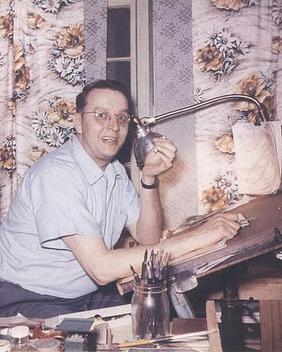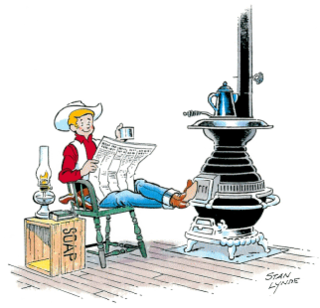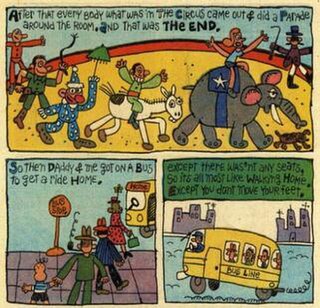
Jack Ralph Cole was an American cartoonist best known for birthing the comedic superhero Plastic Man, and his cartoons for Playboy magazine.

Rick O'Shay is a Western comic strip created by Stan Lynde, which debuted as a Sunday strip on April 27, 1958. The daily comic strip began on May 19 of the same year. It was distributed worldwide through the Chicago Tribune Syndicate. The final Rick O'Shay comic strips written and drawn by Lynde were the daily for 7 May 1977 and the Sunday for July 17, 1977. He left the syndicate after a disagreement. As the syndicate owned the rights to the strip, the popular Rick O'Shay comic strip was continued by others: Marian Dern (writer), Alfredo Alcala and Mel Keefer (artists). Publication ended on March 8, 1981.

Comics Revue is a bi-monthly small press comic book published by Manuscript Press and edited by Rick Norwood. Don Markstein edited the publication from 1984 to 1987 and 1992 to 1996.

William Lemuel "Willie" Lumpkin is a fictional supporting character appearing in American comic books published by Marvel Comics. The character is best known as the mailman of the Fantastic Four in their self-titled comic book.

Myron Stanford Lynde was an American comic strip artist, painter and novelist.

Casey Ruggles is a Western comic strip written and drawn by Warren Tufts that ran from May 22, 1949, to October 30, 1955.
Cottonwood Publishing is now a small press publisher residing in Wolfforth, Texas, established 2019. It is owned and operated by author and secondary teacher Jefferson Marshall and his wife Jordan to publish mainly children's fiction.

Tales of the Green Beret is an American comic strip created by the nonfiction author Robin Moore and artist Joe Kubert. Published in the 1960s, its Vietnam War setting was concurrent with the controversial real-life conflict.

Mickey Finn was an American comic strip created by cartoonist Lank Leonard, which was syndicated to newspapers from April 6, 1936 to September 10, 1977. The successful lighthearted strip struck a balance between comedy and drama. It was adapted to a 400-page Little Big Book and was reprinted in several comic book series throughout the 1930s and 1940s.

The Heart of Juliet Jones is an American comic strip series created by Elliott Caplin and drawn by Stan Drake, beginning on March 9, 1953. The strip was distributed by King Features Syndicate.
Star Hawks was a comic strip created by Ron Goulart and Gil Kane, first published on October 3, 1977, that ran through May 2, 1981. It was written through April 1979 by Goulart, followed by Archie Goodwin (1979-1980), Roger McKenzie (1980-1981) and Roger Stern. Comics veteran Gil Kane provided the artwork, with uncredited help from Ernie Colón and Howard Chaykin.

Henry Boltinoff was an American cartoonist who worked for both comic strips and comic books. He was a prolific cartoonist and drew many of the humor and filler strips that appeared in National Periodical comics from the 1940s through the 1960s.

Betsy and Me is a humorous American comic strip about a dysfunctional, post-war American middle-class family, created by Jack Cole (1914–1958). It was written and drawn first by Cole and then, after his death, by Dwight Parks. Distributed by Chicago Sun-Times Syndicate, the strip ran from May 26 to December 27, 1958.

Dan Dunn is a fictional detective created by Norman W. Marsh. He first appeared in Detective Dan: Secret Operative No. 48, a proto-comic book from 1933, produced by Humor Publishing. He subsequently appeared in newspaper comic strips from 1933 to 1943.

Crack Comics is an anthology comic book series published by Quality Comics during the Golden Age of Comic Books. It featured such characters as The Clock, Black Condor, Captain Triumph, Alias the Spider, Madame Fatal, Jane Arden, Molly the Model, and Red Torpedo. The title "crack" referred to "being at the top of one's form", like a "crack sharpshooter".

Jack Mendelsohn was an American writer-artist who worked in animation, comic strips and comic books. An Emmy-nominated television comedy writer and story editor, he had numerous credits as a TV scripter, including Rowan & Martin's Laugh-In, Three's Company, The Carol Burnett Show and Teenage Mutant Ninja Turtles. Among his work for feature films, he was a co-screenwriter of Yellow Submarine (1968). In 2004, the Animation Writers Caucus of the Writers Guild gave him a Lifetime Achievement Award.

Out Our Way was an American single-panel comic strip series by Canadian-American comic strip artist J. R. Williams. Distributed by Newspaper Enterprise Association, the cartoon series was noted for its depiction of American rural life and the various activities and regular routines of families in small towns. The panel introduced a cast of continuing characters, including the cowboy Curly and ranch bookkeeper Wes. Out Our Way ran from 1922 to 1977, at its peak appearing in more than 700 newspapers.

Right Around Home was a comic strip by Dudley Fisher that was distributed by King Features Syndicate from January 16, 1938 to May 2, 1965.
Little Joe is a 1933-1972 Western comic strip created by Ed Leffingwell and later continued by his brother Robert Leffingwell. Distributed by the Chicago Tribune Syndicate, this Sunday strip had a long run spanning four decades. It was never a daily strip.
The Field Newspaper Syndicate was a syndication service based in Chicago that operated independently from 1941 to 1984, for a good time under the name the Chicago Sun-Times Syndicate. The service was founded by Marshall Field III and was part of Field Enterprises. The syndicate was most well known for Steve Canyon, but also launched such popular, long-running strips as The Berrys, From 9 To 5, Rivets, and Rick O'Shay. Other features included the editorial cartoons of Bill Mauldin and Jacob Burck, and the "Ask Ann Landers" advice column.
















